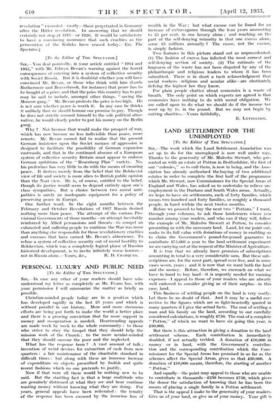PERSONAL LUXURY AND PUBLIC NEED
[To the Editor of THE SPECTATOR.] SIR,—In case any other of your readers should have mis- understood my letter as completely as Mr. Evans has, with your permission I will summarize the matter as briefly as possible.
Christian-minded people today are in a position which has developed rapidly in the last 25 years and which is without parallel in our history. More and more strenuous efforts are being put forth to make the world a better place and there is..a growing conviction that far more support in money and co-operation is needed. Heartrending appeals are made week by week to the whole community : to those Who strive to obey the Gospel that they should help the Mission work of the Church : to the more secular-minded that they should succour the poor and the neglected.
What has the response been ? A vast amount of talk ; invention of weird devices for extraction of cash from new quarters : a fair maintenance of the charitable standard in difficult times : but along with these an immense increase of expenditure on objects prescribed by foolish and quite recent fashions which no one pretends to justify.
Now if that were all there would be nothing new to be said. But the startling fact is that a large multitude who are genuinely distressed at what they see' and hear continue wasting money without knowing what they are doing. For years, general appeals have been reiterated : the tenuity of the response has been excused by the immense loss of wealth in the War ; but what excuse can be found for an increase of extravagance through the lean years amounting to 25 per cent. in one luxury alone ; and reaching on the part of the self-denying minority in that one excess alone, some £3 millions annually ? The cause, not the excuse, is simply fashion.
Two features in this picture stand out as unprecedented. (1) The fashion of excess has infected the most earnest and self-denying section of society. (2) The estimate of the hugeness of the waste has not been disputed by any of the philanthropic and religious leaders to whom it has been submitted. There is in short a tacit acknowledgment that social workers—religious and secular alike—are obstinately defying the highest law they know.
For plain people chatter about economics is a waste of breath. The only point on which experts are agreed is that economics have nothing to do with moral obligation. We are called upon to do what we should do if the income tax went up by ls. in the pound. But we may not begin by cutting charities.—Yours faithfully, E. LYTTELTON.


















































 Previous page
Previous page